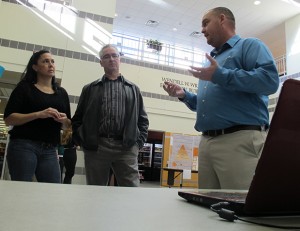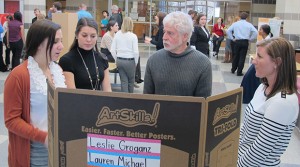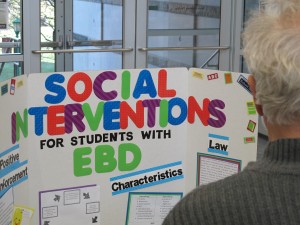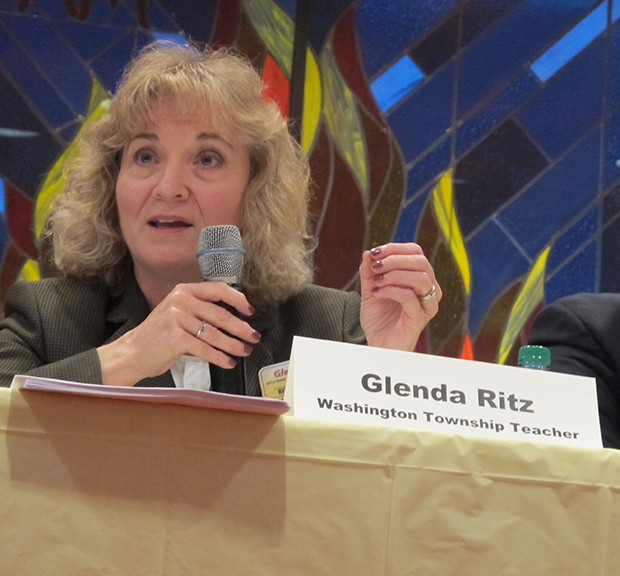Should Indiana Teachers Be 'Experts' In The Subjects They Teach?

Kyle Stokes / StateImpact Indiana
A student makes his final presentation for his class on special education in the atrium of the IU School of Education in December 2012.
As a teacher, it’s not enough to know subject matter you’re teaching, Derek Redelman says — knowing how to teach that subject matter is important.
But “no matter how good your pedagogical skills,” says Redelman, who watches state education policy for the Indiana Chamber of Commerce, “it is simply not possible to be an effective educator if you don’t know the subject you are teaching.”
That’s why Redelman backs Indiana’s new “REPA II” teacher licensing rules, which the the State Board of Education finalized earlier this month.
Supporters say the new rules open pathways into the teaching profession for non-traditional applicants who may not have education degrees, but do have expert-level knowledge of content.
But few students, professors or administrators in Indiana’s colleges of education can stomach the new rules — in part because many say REPA II’s supporters have the content-versus-pedagogy issue backwards.
- What Skills Future Indiana Teachers Are LearningTo get a feel for what education majors are learning in Indiana’s colleges, StateImpact Indiana‘s Kyle Stokes visited the Indiana University School of Education during finals week presentations.Download
Theresa Ochoa, an associate professor in special education at Indiana University, worries about non-traditional applicants who get jobs under the new REPA II rules.
—Sandi Jacobs, NCTQ
The guidelines allow anyone with a bachelor’s degree and a 3.0 GPA to earn an “adjunct permit,” a credential sufficient to hold down a teaching job provided the teacher can pass a test, complete on-the-job training and earn high evaluation marks in their first five years on the job.
While the adjunct permit is designed to get more content experts into the classroom, Ochoa says even someone with subject matter expertise must know how to relay that knowledge to students.*
“These teachers are going to walk into the classroom with a lot of content, but it’s going to take some a long time for them develop the pedagogy,” Ochoa says. “In the process of that time, we have students in their classroom who are not going to be able to have someone who is responsive to their learning characteristics.”
Or more simply, as IU junior and education major Taralyne Hillegonds puts it, “I don’t doubt that these people get their subjects. I’m just not sure that they should be teaching them.”
Put Emphasis On Content?
Indiana’s new state superintendent Glenda Ritz had prominently campaigned against the REPA II guidelines, which had been months in the making by the time they came up for a vote at the December State Board of Education meeting.
But over the objections of Ritz and a host of professional organizations, teacher unions and colleges of education, former state superintendent Tony Bennett and the State Board approved the guidelines.
“The more opportunities we have with the ability to bring talent into Indiana classrooms, talent into Indiana school buildings, talent into Indiana school corporations, I think that’s good public policy,” Bennett said in December after the rules passed.Sandi Jacobs, who tracks teacher preparation standards for the National Council on Teacher Quality. She says REPA II is a positive step toward opening a route into the teaching profession for non-traditional applicants. She told StateImpact in an interview:
Indiana really has done some real heavy lifting to try to improve and streamline licensure and certification requirements for teachers. I think they’ve put a lot of emphasis on content, which makes sense as we are moving forward with the Common Core State Standards. I really think Indiana is a state to watch…
Our student achievement isn’t where we want it to be. And we have clear research evidence that tells us how much teachers matter to student achievement, so it’s only logical that we’re going to look at teacher preparation and say, ‘Are we turning out teachers… who are as prepared as they need to be for students and to help them grow and achieve?’
That said, Jacobs adds she worries the final tweaks to the REPA II package — which requires teachers who hold adjunct permits to get on-the-job training to renew their licenses — could be too prescriptive.
“We want alternatively-certified teachers to be well-prepared for the classroom, but we also want to make sure that we’re providing them with a streamlined program specifically designed for the non-traditional candidate,” Jacobs says. “The list of coursework that’s now included seems awfully similar to what might be included in a traditional program.”
In his State Board testimony, Redelman said the licensing rules do not require Indiana school administrators to hire a teacher with an adjunct permit, or any other candidate for a job they feel to be less-than-qualified.
“All that you are doing — other than raising the bar on content knowledge — is providing greater flexibility at the local level and allowing the potential pool of candidates to be expanded,” Redelman told the panel. “Any candidate for a job must still go through a hiring process where, I certainly hope, the professionals making those hiring decisions will consider all the qualifications of the candidate.”
For Ed Majors, Pedagogy Is Key

Kyle Stokes / StateImpact Indiana
IU School of Education students present research projects as part of their final presentation for a special education course. Groups of students researched methods for teaching students with special needs or learning disabilities.
IU School of Education administrators resent the implication that their students don’t have mastery over the subject matter. They say an education major studying to teach math, for example, takes many of the upper-level math courses a math major does.
But beyond that, Ochoa says subject-matter experts need training on how to craft a lesson to meet the needs of the learner — and be able to recognize when a lesson isn’t working. As Ochoa told StateImpact:
It appears that pedagogy doesn’t have as prominent a place in secondary-level schools, but it actually does. If you look at dropout rates, if you look at referrals, if you look at suspensions, all of those things are not necessarily a result of academic underperformance. Those are the results of unmanaged classrooms.
If you get a secondary-level teacher who is excellent at teaching history but they’re not… getting training to spot the kid who is just checked-out. That is the behavior management that maybe elementary-level teachers are getting, but the secondary-level teachers say, “This is all academic.” That’s really the rub.
Chad Roggeman, an IU senior majoring in elementary education, says his fellow students are learning pedagogy in theory and in practice.
“You’re reading articles about classroom situations, classroom management, classroom teaching strategies — stuff you can actually apply when you do have real field experience,” Roggeman says.

Kyle Stokes / StateImpact Indiana
A board on display at an IU School of Education special education's final presentation expo.
Like at most traditional teacher preparation programs, Indiana University students are required to both observe live classrooms and student teach before earning their diplomas. Some alternative certification programs, such as at Butler University and Purdue North Central, do not require any student teaching.
IU junior Taralyne Hillegonds admits someone graduating without an education degree may make a great teacher, but she says ed school helps prospective teachers enter the profession with clear eyes.
“You have to be able to discipline, you have to be able to deal with parents who may be too present or not present at all, you have to deal with kids from different economical situations, and all kinds of things,” Hillegonds says.
“There’s so much into it,” she adds, “that you don’t get if you’re just studying the content.”
*CLARIFICATION: After initially posting this piece, we tweaked the wording of the asterisked paragraph.
Podcast: Play in new window | Download



